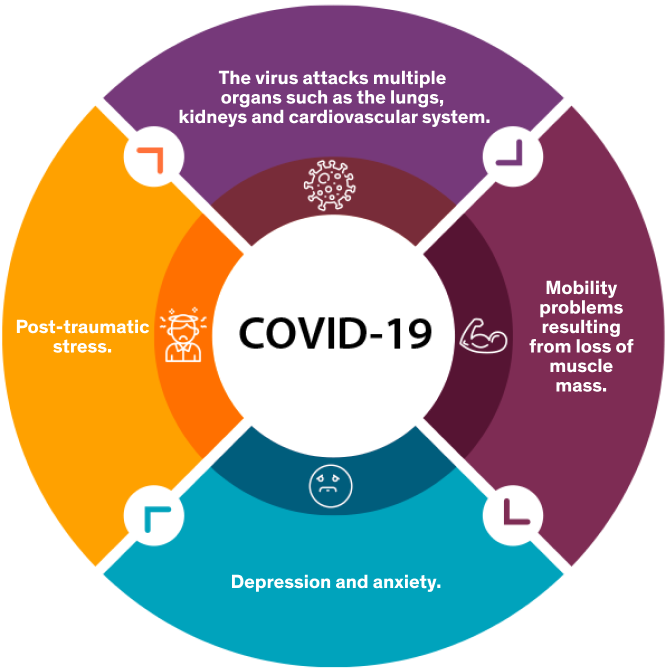COVID-19 aftereffects can be of various types, both physical and psychological. They depend largely on the severity of the disease and the medical care the patient received.
A patient who did not require hospitalization may not present any aftereffects, while a patient who was admitted to intensive care may have several aftereffects both due to the disease and immobility during treatment.

Detect pulmonary fibrosis due to COVID-19 aftereffects in time
One of the most affected functions after recovery from COVID-19 is the pulmonary function, the tissue is damaged and scars occur causing it to become thick and hard, making it difficult for oxygen to reach the blood vessels, affecting your breathing.
The damage caused by pulmonary fibrosis is evolutionary and cannot be reversed. If caught early, it can be delayed and sometimes even stopped.
When to consult a doctor?
In case of presenting any symptoms mentioned in the table, see a specialist so that a pulmonary exploration can be carried out. The specialist may request additional tests, such as:
Respiratory capacity tests and studies.
Blood tests to evaluate other organs’ involvement.
If detected early, pulmonary fibrosis can be stopped.
Signs and symptoms of pulmonary fibrosis include the following:
- Difficulty breathing.
- A hacking, dry cough that does not get better.
- Tiredness
- Weight loss for no apparent reason.
- Muscle and joint pain.
Detect Post-COVID-19 cardiovascular aftereffects early
Patient case studies suggest that COVID-19 generates aftereffects in the cardiovascular system, in some cases presenting inflammation of the heart muscle (myocarditis). When the heart is inflamed, it cannot pump effectively due to edema, which can lead to heart failure, abnormal heart rates (arrhythmias), and sudden death.
Early diagnosis is key to preventing long-term heart damage.
When to consult a doctor?
In case of presenting any symptoms mentioned in the table, see a specialist so that a cardiovascular examination can be carried out. The specialist may request additional tests, such as:
- Electrocardiogram (EKG)
- MRI
- Echocardiogram
Signs and symptoms of myocarditis include the following:
- Chest pain. Abnormal or fast heart rhythms (arrhythmias).
- Difficulty breathing at rest or during physical activity.
- Swelling of the legs, ankles, and feet. Fatigue.
- Other signs and symptoms of a viral infection, such as headache, body aches, joint pain, fever, sore throat, or diarrhea.
Depression, anxiety, and post-traumatic stress disorder can be COVID-19 aftereffects
These aftereffects can be caused both by the immune response to the virus or by stressors such as social isolation, the psychological impact of a new serious and possibly fatal disease, or concern about contagion to family and friends.
Depression: It is an emotional disorder that causes a constant feeling of sadness and a loss of interest in doing different activities.
Anxiety: People with anxiety disorders often have intense, excessive, and persistent worries and fears about everyday situations.
Post-traumatic stress disorder: It is a mental health illness triggered by a terrifying situation, whether you have experienced or witnessed it.
When to consult a doctor?
If you feel depressed or anxious, go to our specialists for an assessment, diagnosis, and proper treatment or contact a close friend or loved one.
Among the signs and symptoms of depression:
- Feelings of sadness, crying, emptiness, or hopelessness
- Outbursts of anger, irritability, or frustration
- Loss of interest
- Sleep disturbances, such as insomnia or sleeping too much
- Tiredness and lack of energy
- Anxiety, agitation, or restlessness
- Feelings of worthlessness or guilt
- Difficulty thinking, concentrating, making decisions, and remembering things
- Frequent or recurring thoughts about death, suicidal thoughts, suicide attempts, or suicide
Among the signs and symptoms of anxiety:
- Feeling nervous, agitated, or tense
- Feeling of impending danger, panic, or catastrophe
- Increased heart rate
- Accelerated breathing (hyperventilation)
- Feeling weak or tired
- Having trouble falling asleep
- Having gastrointestinal problems (GI)
Among the signs and symptoms of PTSD:
- Recurring, involuntary, and distressing memories of the traumatic event
- Reliving the traumatic event
- Disturbing dreams or nightmares about the traumatic event
- Severe emotional distress or physical reactions to things that remind you of the traumatic event



